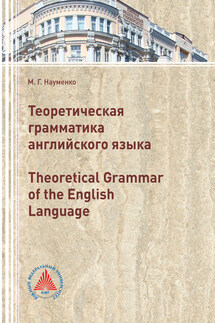Теоретическая грамматика английского языка (Theoretical Grammar of the English language) - страница 7
The existence of such lexico-grammatical classes has never been a debatable issue among the linguists, although there are different views on the principles of classifications. The representative of the English scientific grammar H. Sweet stressed the need to take into account the meaning, form and function of words, but he emphasized the priority of the form over the other criteria. The representative of structuralism Ch.Fries emphasized the priority of the function (syntactic criterion).
In modern linguistics parts of speech are also differentiated either by a number of criteria, or by a single criterion.
Traditional classification
The polydifferential ("traditional") classification of words is based on the three criteria: semantic, formal, and functional. The semantic criterion presupposes the evaluation of the generalized (categorial) meaning of the words of the given part of speech. The formal criterion provides for the exposition of all formal features (specific inflectional and derivational) of all the lexemic subsets of a particular part of speech. The functional criterion concerns the typical syntactic functions of a part of speech. Contractedly the set of these criteria is referred to as "meaning, form, function" (Blokh, 2000).
In accord with the traditional criteria of meaning, form, and function, words on the upper level of classification are divided into notional and functional.
Prof. Blokh calls the notional parts of speech the words of complete nominative value; in the utterance they fulfill self-dependent functions of naming and denoting things, phenomena, their substantial properties (Prof. Blokh). Opposed to the notional parts of speech are the functional words which are words of incomplete nominative value, but of absolutely essential relational (grammatical) value. In the utterance they serve as all sorts of mediators (Blokh, 2000).
To the basic functional parts of speech in English are usually referred the article, the preposition, the conjunction, the particle, the modal word, the interjection. Functional words are limited in number. On the lines of the traditional classification they are presented by the list, each of them requiring its own, individual description.
The syntactic (monodifferential) classification of words is based on syntactic featuring of words only. The syntactic classification of words, in principle, supplements the three-criteria classification specifying the syntactic features of parts of speech. For the Russian language the basic principles of the syntactic classification of words were outlined in the works of A.M. Peshkovski. In English the syntactico-distributional classification of words was worked out by structuralists L. Bloomfield and his followers Z. Harris and Ch. Fries. The syntactico-distributional classification of words is based on the study of their combinability by means of substitution tests. As a result of this testing, a standard model of four main syntactic positions of notional words was built up. These positions are those of the noun, verb, adjective, and adverb. Pronouns are included into the corresponding positional classes as their substitutes. Words incapable to occupy the said main syntactic positions are treated as functional words.
The noun as a part of speech
The noun as a part of speech has the categorical meaning of “substance. The noun is characrerised by the syntactical function of a subject, object, predicative, adverbial modifier, attribute. Typical of nouns is the prepositional combinability with another noun, with adverb, and adjective. The noun is characterized by the following grammatical categories: gender, number, case and article determination (prof. Blokh).


